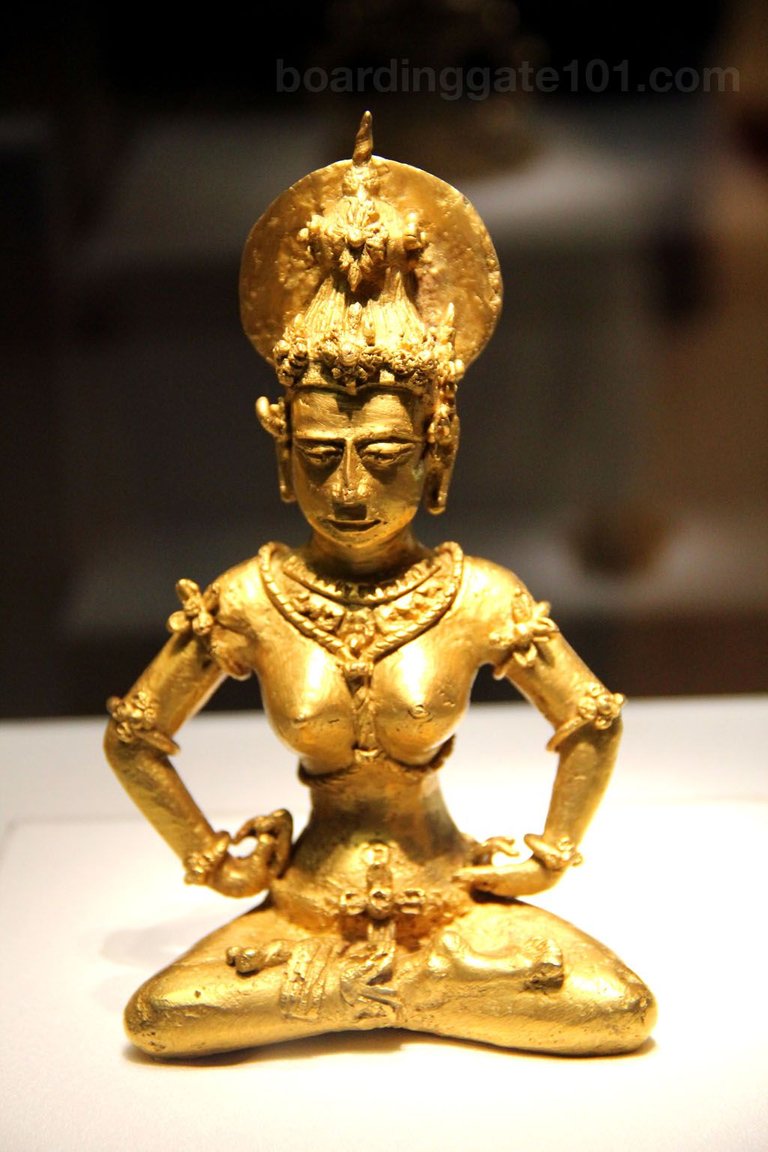THE GOLDEN TARA
When you think of Buddhism one doesn’t really think of the Philippines as a nation with a history of the religion. Today, Roman Catholicism is the dominant religion of the country followed by Islam. Due to Spanish colonization, missionaries brought Christianity into the islands and over the 333 years of colonization the majority of the people converted from their indigenous beliefs to the new faith.
However prior to the colonization, there is a history in the Philippines that is relatively unknown, that is the influence of Buddhism and Hinduism. We have no awe inspiring monuments like Borobudur in Indonesia or Angkor Wat in Cambodia that indicate that Buddhism was prevalent.
However we do still have evidence through the oldest document in the Philippines, the Laguna Copperplate, and various recently discovered artifacts. One of these artifacts is the Golden Tara, also known as the Golden Agusan Image, one of the only deity representations recovered in the Philippines.
The Golden Tara is “One of the most spectacular discoveries in the Philippine archaeological history.” Also regarded as the Icon of the Storied Past of the Pre Colonial Times of Butuan.
But how exactly was it discovered and who discovered it?
In 1917 after a storm and flood, a 21-carat golden figurine of a female deity of Hindu was found by a Manobo woman on a muddy bank of Wawa River, a tributary of the large Agusan River. This ancient figure seated in lotus position weighs nearly 4 pounds which is the earliest known image identified to be an Indian in origin. The image corroborates a single cultural sphere that developed in the archipelagic regions of Southeast Asia during the height of trade between Butuan and the rest of the Sri Vijaya Empire.
And In 1989 a sand laborer working on Lumbang River near the outlet to Laguna de Bay found a plate in Barangay Wawa, Lumban, in the Laguna province.The Laguna Copperplate Inscription (also shortened to LCI) is the earliest known written document found in the Philippines.
The inscription on the plate was first deciphered by Dutch anthropologist Antoon Postma.
The discovery of the plate has highlighted the evidence of cultural links present between the Tagalog people of this time and the various contemporary civilizations in Asia, most notably the Javanese Medang Kingdom, the Srivijaya empire, and the Middle kingdoms of India, a topic in Philippine history of which not much is presently known.
Before the Spanish period, the archipelagoes of Southeast Asia were under the influence of traders from the Hindu-Malayan culture, such as the Majapahit Empire, which was then supplanted by Islamic teaching by Muslims traders from Gujarat, India. Influences from the Indian subcontinent may be traced earlier to before the arrival of the Arabs and the Europeans during the 15th and 16th centuries respectively. The rulers of many of the islands were called Rajas, or Rajahs. An example would be the Visayas, said to be named after the last Southeast Hindu Prince Srivijaya.
Although Hinduism is now a minority religion in the country, some of its beliefs still pervade the national psyche; it is socially and culturally ingrained in Filipinos, most of whom are either part of the Christian majority (Roman Catholic and Protestant), or part of a significant Muslim minority. An example is that the concept of karma is readily understood by locals and forms part of native ethics.
Today, a replica is stored at the Butuan museum and a monument is erected near Balanghai Hotel which is also adjacent to the City Hall.
The original Tara? It is now at the Field Museum of Natural History in Chicago.
Now the lingering question remains. Will the Golden Tara find her way back home? Will she be returned to our people to learn from her and her history? If she does come back home where will she be displayed? In the National History Museum? Back to Agusan? Perhaps it will be in the hands of the private Ayala Museum collection? Unless we can fix our corrupt government and support the field of archaeology and anthropology as well as our museums, the Golden Tara is safer in Chicago.
Do you dream of her returning back to us?

Hi! I am a robot. I just upvoted you! I found similar content that readers might be interested in:
http://agusandelsur.gov.ph/index/using-joomla/extensions/components/content-component/article-categories/78-demo/slides/80-golden-tara